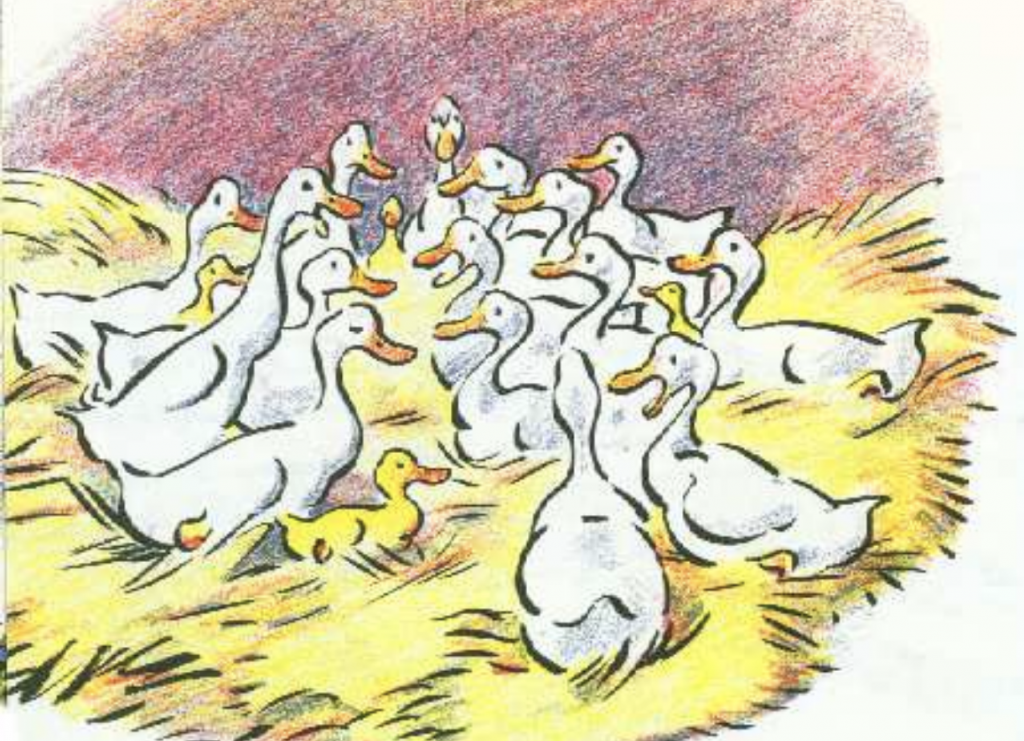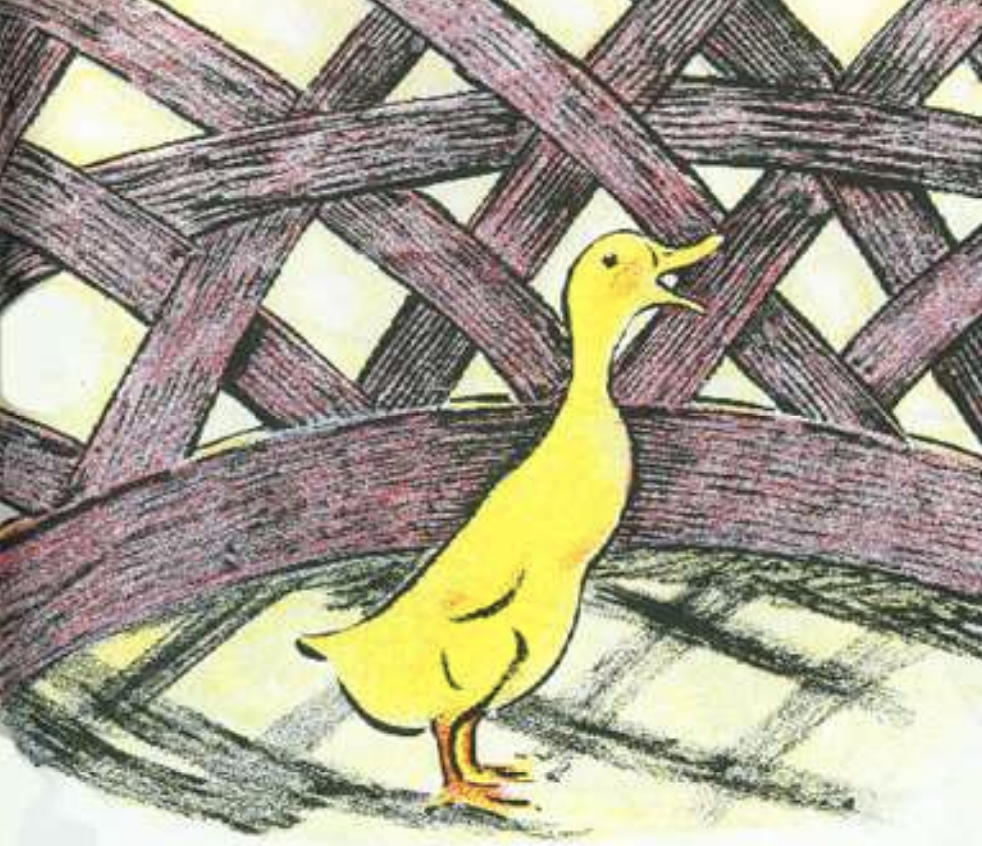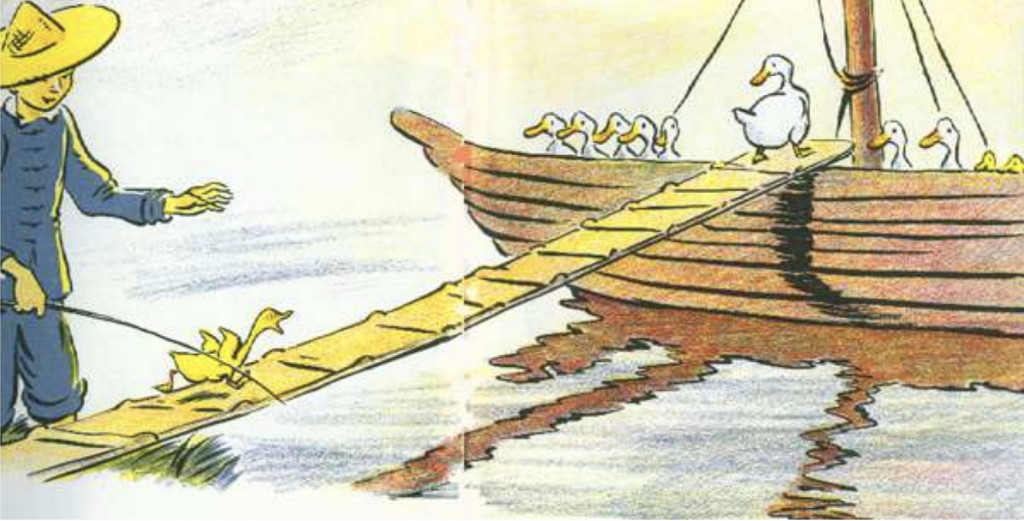All my life, I have loved to read — and as a little girl, there was nothing I loved more than hearing my mother and father’s voices reading me a story.
Each night, I would snuggle under my covers and eagerly wait for one of them to choose a book. Maybe it would be a Dr. Seuss classic or a Berenstain Bears adventure. Perhaps I’d get to hear about Aunt Tildy’s elephant or be sent off to sleep with the image of a poky little puppy running through my mind.
It didn’t matter what they chose because I loved any and all books.
Well… Except for one.
I loathed the children’s book The Story About Ping.
What was to like?! There was an adorable duck that gets left behind and lost; scary people who want to eat him; the imminent, terrifying fear of being spanked… It was all so awful. Any time my mother or father reached for that book on the shelf, I inwardly — and probably outwardly — squirmed. Whether they continued to read it because my siblings liked it or simply because they thought it had a good moral, I don’t know, but I absolutely detested that little book.
Until, that is, a few months ago.
Unfortunately, I’ve long since outgrown my parents reading me bedtime stories. So while my mom didn’t actually read this story to me, she brought it up in conversation recently and put it in a whole new light for me. The Story About Ping — a story that I once thought was scary and mean and pointless — has become one of the most beautiful allegories of repentance that I have ever encountered.
And I want to share it with you.
The Premise of The Story About Ping

For any of you who haven’t read The Story About Ping, written by Marjorie Flack and illustrated by Kurt Wiese, you can do so here. It’s a short, easy read, and I’d really recommend you read it — but if reading children’s books isn’t your jam, don’t fret: I’ll give a little background here. The funny thing about this book is that I can find absolutely no record anywhere (although maybe I missed it) of the author having Christian motives in writing the book, and no accounts of people looking at it through a Christian lens — yet it is fraught with wonderful symbolism.
Ping is a precious, domesticated young duck who lives on a “wise-eyed” boat on the Yangtze river in China with his mother, father, brothers, sisters, and basically entire extended family. Each day, the ducks swim in the river and hunt for food, and each night, when the boat master calls for them, the ducks scurry back onto the boat.
All in all, it’s a pretty cushy, happy life for these ducks, except for one small detail: whichever duck is the last to make it onto the boat each night gets a spank on the back. (And while I personally don’t love the idea of spanking, times were different when this book was published in 1933 — so to keep the verbiage the same throughout this post, I’ll use the term “spanked” since it’s what was used in the book. However, you can substitute “chastised,” “lectured,” or whatever term you feel is most appropriate.)
Ping is “very-very careful” not to be the last duck on the boat because he does not want to get spanked. But one day Ping is diving for something tasty in the water and doesn’t hear the boat master call to the ducks. By the time Ping surfaces, he realizes that it’s too late:
“Ping knew he would be the last, the very last duck if he crossed the bridge. Ping did not want to be spanked.
So he hid.”
Ping hides in the bushes and waits for the boat to return the next morning. But when morning comes, there’s no boat — so Ping decides to find it himself. He swims around looking for his boat, but there are so many boats. While he’s swimming, Ping sees some captivating birds diving for delicious fish, only to realize upon closer inspection that they are actually in captivity with rings around their necks and are forced to find fish for their masters but are prevented by the rings from eating them. Understandably, this terrifies him. He swims away but ends up being captured by a family who wants to eat him.
Ping is distraught. All day, he has to look through the small holes of the basket the family has trapped him in. He has all day to think about the life that he has given up because he was too scared of a spanking. No one can save Ping now — not his mother, his father, his sisters or brothers.
Everything appears lost until the family’s son, a sweet little boy, comes and lifts the basket off of Ping and slips him back into the water — even though the boy will surely be punished for this act of mercy.
As Ping swims away, he hears his master’s call. He swims over to his boat… only to see his family all lined up. Again, Ping is late. But he knows what he must do to find the happiness he longs for once again.
“As Ping reached the shore the last of Ping’s forty two cousins marched over the bridge and Ping knew that he was LATE again! But up marched Ping, up over the little bridge and SPANK came the spank on Ping’s back!
Then at last Ping was back with his mother and his father and two sisters and three brothers and eleven aunts and seven uncles and forty-two cousins. Home again on the wise-eyed boat on the Yangtze River.”
The Fear of Being Spanked

In Ping’s story, he’s so terrified of being punished that he does what all of us have done at some point or another: he hides.
This is one of the adversary’s most effective tools: when we feel ashamed, fearful, and scared, he makes us think we can get out of “punishment” by hiding. He’s been using it since the beginning of time! Just look at Adam and Eve:
“Immediately after God left Adam and Eve in the garden, telling them to partake freely of the fruit of all the trees except one, of which they were commanded not to partake, Satan began his nefarious plan for their destruction. Following Satan’s successful attempt, God returned to the garden; and because they were ashamed, Adam and Eve were hiding from him, so he called: ‘Where art thou?’ a question which can and does apply to every one of us individually and collectively, and one which we might well be asking ourselves as it applies to our relationship to God and our fellowmen.
Adam replied: ‘… I heard thy voice in the garden, and I was afraid, because I was naked; and I hid myself.
‘And he said, Who told thee that thou wast naked?” (N. Eldon Tanner, “Where Art Thou,” October 1971).
We know the rest of the story. Satan, who didn’t understand God’s plan, thought that he could destroy everything by causing Adam and Eve to break a commandment — one that there was no coming back from.
But what Adam and Eve didn’t realize when they hid — what Satan convinced them wasn’t true — is that there is always, always, ALWAYS a way back, and that way is Jesus Christ.
The Fear of the Spanking is So Much Worse Than the Actual Spanking

One of the things that Adam and Eve didn’t realize in that moment in the garden — and that Ping obviously didn’t realize on the Yangtze river — was that the fear of being punished was much worse than the actual punishment.
To put it simply, Adam and Eve saw no way back. They’d messed up too much, done too much damage, gone too far. They were doomed, their future dismal.
In The Story About Ping, it seems like our little duck friend had never been spanked before. Maybe he’d had a few too-hard pats on the back, maybe he’d had a play session that got a little too intense with his siblings, maybe he’d been bitten by something in the river… But he’d never been spanked by someone so much bigger, so much greater than him.
And it seemed really scary.
In both stories, instead of facing up to what they’d done, our characters initially choose to hide. And what they end up facing — the fear, the unsurety, the shame and pain — is so much worse than the very thing they had feared: being “spanked” or chastised by God.
At the beginning of Ping’s story, the life he had was a good life: he was happy, secure, and content. Then he stumbled and made a mistake. He tried to go back to his old life, but he couldn’t find it. It seemed there was no way back. And the life that he chose to pursue instead? It was absolutely horrible. It was filled with pain, misery, and loneliness. Even the birds that from far away looked like they were having a good time were in reality trapped, experiencing the happiness of finding a fish but then never getting to enjoy it. No matter how it appeared at first glance, any happiness they may have felt was short-lived and shallow.
Yet in both narratives, just when things seem completely hopeless — like all is lost — our beloved characters are saved by someone who risks their own happiness and safety so that our heroes can again find life and joy. And as it turns out, life after the “spanking” is so much better: Adam and Eve experience true joy because they now know sorrow, and Ping no longer spends his life in fear of the spanking. Their repentance — the very thing they were avoiding — brings even greater fulfillment and meaning to their lives.
Here’s the thing: yes, repentance hurts. It hurts to face what we’ve done, to own up to it, to acknowledge that we’ve messed up and hurt our spirits and maybe even other people. It’s painful to talk to your bishop. It hurts not to be able to take the sacrament, not to be cleared for baptism, not to be able to give your daughter a priesthood blessing when she so desperately needs one. It’s heart-wrenching to look your husband in the eye and say sorry, to admit to your mother that you made a huge mistake, to have to say “I can’t do it” when your little boy turns eight and wants you to baptize him, to perhaps even have your membership in the Church revoked. I may not know that pain, but I do know that no matter your circumstances, you’re experiencing nothing that Christ hasn’t felt, nothing that He hasn’t already atoned for.

To read more of Amy’s articles, click here.
But what hurts even worse than any of those things is a life without Jesus Christ — not just without the restored gospel, not just without our church community, not just without priesthood ordinances, but without Jesus Christ, without living by the things He has taught. Because no matter how shiny and beautiful those birds diving on the Yangtze river looked, they still had rings around their necks. No matter how fun life without Christ looks, deciding not to live by His teachings — refusing to live without Him in your life at all — will only bring heartache and confusion.
I have learned that when you accept the spanking, life only gets better. But when you avoid it, life is filled with fear, pain, and desperation.
And the wonderful, awe-inspiring reality is that Jesus Christ already took the worst part of the spanking for us. I can guarantee that the little boy’s punishment was a lot more painful than the spanking Ping endured, and that Jesus Christ’s Atonement was a whole lot more painful than having to leave the Garden of Eden. And while you have to be the one to humbly accept the spanking — and yeah, ouch — Christ will hold you up, strengthen you, and help you as you recover.
So next time you’re tempted to run and hide, to do whatever you can however you can to avoid a spanking, I hope you remember Ping the duck. I hope you remember that in life, there are much worse things than being spanked.
About Amy Carpenter
Amy Carpenter is the site manager and editor for LDSBlogs.com. She served a full-time mission for The Church of Jesus Christ of Latter-day Saints in Denver, Colorado, where she learned to love mountains and despise snow. She has a passion for peanut butter, dancing badly, and most of all, the gospel.
Twitter •







Isn’t it interesting how each of us build up our fears of the ‘what if’ instead of having the courage to actually find out if it’s true? (Even when we know it’s true, LOL.) Repentance is always better than not repenting.
Makes me think of how faith and fear are such total opposites.
I loved this analogy and hope I can remember it when I have to fight my feelings of fear, shame, and embarrassment when it’s time to admit to a mistake, weakness, or wrong choice. Thanks for giving me some great food for thought today.
I am so glad it resonated with you, Susanne! It was such an eye-opening metaphor to me, and I’m glad it spoke to you as well. You’re right — repentance is ALWAYS better than the alternative. Thank you for your sweet comment!
My childhood included Ping the Duck, too. I loved how you wove such a beautiful metaphor into such an applicable lesson. Thanks!
That is the HUGEST compliment ever coming from an author and human that I so deeply admire. <3 Thank YOU, Delisa!
Like usual, you made my day! Thank YoU, Amy!
I can feel how ping felt…..a huge thanks to you…..